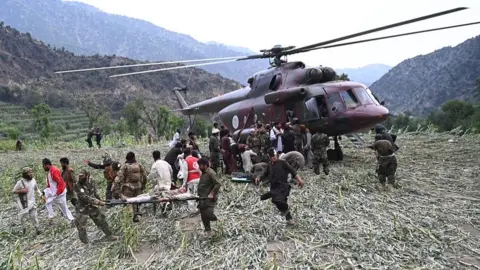A fresh magnitude-5.2 aftershock has struck eastern Afghanistan - two days after a powerful quake in the same region killed more than 1,400 people and injured 3,000 others, according to the Taliban government.
Rescue efforts following Sunday's magnitude-six quake have been complicated by landslides that have blocked roads, making land travel difficult. Helicopters have been deployed to aid the search for survivors in the ruins of remote villages, where many are feared trapped under the rubble.
The Taliban government, which is only recognised by Russia, has appealed for international help. The UN has released emergency funds while the UK has pledged £1m ($1.3m) in aid.
Afghanistan is prone to earthquakes, but Sunday's tremor was one of the strongest to hit in recent years. The aftershock on Tuesday came at 12:29 (07:59 GMT) with its epicentre 34km (21 miles) away from Jalalabad, the country's fifth-largest city, according to the US Geological Survey (USGS). It was shallow, at only 10km deep. A BBC reporter in the Sawkai district - one of the worst affected areas in the north-eastern Kunar province - said they felt a strong jolt, but there are no reports of damage or new casualties.
Helicopters are being used to airlift survivors out of remote villages in Kunar province, where most of the deaths and injuries occurred. The terrain was so rough in one part of the Mazar valley that one helicopter failed to land after three attempts, one Taliban source said.
Survivor Bas Marjana, a resident there, told the BBC: We were all in deep, peaceful sleep when... a sudden tremor struck, and the world turned upside down. She said she was rescued from underneath the rubble of her home, but several family members were buried. Eight of her grandchildren and her daughter-in-law were among the dead.
The situation is dire as aid agency Save the Children has sent medical teams to the Kunar province to treat and rescue people in remote areas, stating that thousands are in urgent need of food, water, and shelter. A volunteer from the agency said some people have resorted to drinking river water.
The recent earthquake comes at a time when Afghanistan faces severe drought and an unprecedented hunger crisis, exacerbated by massive aid cuts, especially from the US. Britain's Foreign Secretary David Lammy mentioned that aid from the UK will be channelled through experienced partners, including the UN Population Fund and the International Red Cross. India, China, and Switzerland have also pledged to provide support.
Rescue efforts following Sunday's magnitude-six quake have been complicated by landslides that have blocked roads, making land travel difficult. Helicopters have been deployed to aid the search for survivors in the ruins of remote villages, where many are feared trapped under the rubble.
The Taliban government, which is only recognised by Russia, has appealed for international help. The UN has released emergency funds while the UK has pledged £1m ($1.3m) in aid.
Afghanistan is prone to earthquakes, but Sunday's tremor was one of the strongest to hit in recent years. The aftershock on Tuesday came at 12:29 (07:59 GMT) with its epicentre 34km (21 miles) away from Jalalabad, the country's fifth-largest city, according to the US Geological Survey (USGS). It was shallow, at only 10km deep. A BBC reporter in the Sawkai district - one of the worst affected areas in the north-eastern Kunar province - said they felt a strong jolt, but there are no reports of damage or new casualties.
Helicopters are being used to airlift survivors out of remote villages in Kunar province, where most of the deaths and injuries occurred. The terrain was so rough in one part of the Mazar valley that one helicopter failed to land after three attempts, one Taliban source said.
Survivor Bas Marjana, a resident there, told the BBC: We were all in deep, peaceful sleep when... a sudden tremor struck, and the world turned upside down. She said she was rescued from underneath the rubble of her home, but several family members were buried. Eight of her grandchildren and her daughter-in-law were among the dead.
The situation is dire as aid agency Save the Children has sent medical teams to the Kunar province to treat and rescue people in remote areas, stating that thousands are in urgent need of food, water, and shelter. A volunteer from the agency said some people have resorted to drinking river water.
The recent earthquake comes at a time when Afghanistan faces severe drought and an unprecedented hunger crisis, exacerbated by massive aid cuts, especially from the US. Britain's Foreign Secretary David Lammy mentioned that aid from the UK will be channelled through experienced partners, including the UN Population Fund and the International Red Cross. India, China, and Switzerland have also pledged to provide support.



















